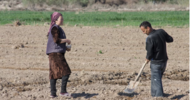A new breed of colonialism is rampaging across the world, with rich nations buying up the natural resources of developing countries that can ill afford to sell. Some staggering deals have already been done, but angry locals are now trying to stop the landgrabs
- The Independent
-
09 August 2009
It is essential that governments and international agencies act now to create not only a uniform code of conduct guiding foreign land acquisitions, but also an enforcement mechanism.
- World Politics Review
-
05 August 2009
The $1bn project, dubbed 7X7, aims at developing 700,000 ha of farmland to produce within 7 years 7 million tonnes of rice in Mali, Senegal and maybe Sudan and Uganda.
Because of the political sensitivity of the modern-day land grab, it is often only the country's head of state who knows the details. Der Spiegel investigates.
"The government has verified and delineated 1.6 million hectares of virgin land suitable for large-scale commercial farming in different parts of the country," Esayas Kebede, Director of the recently formed Agricultural Investment Support told Reuters.
If the host state and foreign investors act in conformity with these suggestions, they will maximise the prospects that any large-scale land transaction benefits all stakeholders and minimise the chances of concluding harmful deals.
The Confederation of Indian Industry disagrees with critics of India's foreign landgrabbing for agriculural production
2009 is the year characterised by Arab' 'land grabs', where developing countries have been targeted by the kingdom as having the potential to feed the swelling food demands of Saudi Arabia
- Companies and Markets
-
17 July 2009
"Our message is clear: it is not up to the G8 to set development strategies and programmes for Africa."
Private Saudi firm Planet Food World (PFWC) will invest around $3 billion in agriculture in Turkey over the next five years to export food products to the Gulf region, the head of its Turkish unit said.
The boom in the acquisition of arable land in Africa by foreign companies and governments has stirred an international debate between international institutions such as the United Nations’ Food and Agriculture Organisation (FAO) and non-governmental groups and independent experts.
A focus on agricultural productivity should not become a cover for foreign private companies to grab land or impose expensive, input-intensive methods in the name of modernisation.
Activists say as many as 150,000 people in the Tana River delta could be displaced by the Qatari land-lease deal -- and it is not the only one in Kenya.
Will Malaysia be emulating other nations by looking abroad to plant staple crops like rice, or rear cows, goats, chicken and fish to secure a sustainable food supply?
India, once the colonial jewel of Britain's empire, has been accused of 'neo-colonialism' in Africa where its business people have joined a race with China, Saudi Arabia and elsewhere to buy up agricultural estates and take advantage of cheap labour.
- The Telegraph
-
28 June 2009
I wonder why the people (and more importantly the political leaders and elite) of the African and Latin American countries are not opposing and driving these companies out from within their national borders. The reason is simple. The rich and elite of every country is the real beneficiary of the process of globalisation.
- Ground Reality
-
26 June 2009
Indian firms have signed land deals in Ethiopia, Kenya and Madagascar to produce a range of food crops for export to India.
Contrary to past trends, countries in the Global South are initiating much of the investment.
- Foreign Policy in Focus
-
18 June 2009
Codes of conduct don’t work, said Devinder Sharma of Forum for Biotechnology and Food Security, Delhi. “It is unethical to grab land in other countries; it will lead to food crisis as investor countries will grow food for profit.”
- Down to Earth
-
17 June 2009
It's a tsunami of land deals and, as all of the experts who have studied the phenomenon have agreed, no nation is truly prepared for its implications.
- CounterCurrents
-
17 June 2009
Corruption has reached tremendous levels in Kenya. The distance between the poor and wealthy is at its greatest and Kenyans are wondering how to emerge from an unjust system in the land that gave birth to Humanity.
"The rush for land by outside players is more proof of the enormous potential of African agriculture. Africa itself must harness this potential," Kofi Annan says
What we are witnessing in countries like Ethiopia today is an extreme form of the banana republic syndrome.
A multi-million birr investment project by Karuturi Global Limited, an Indian company in Etang Special Woreda of Gambella State was launched on Saturday.
- Ethiopian News Agency
-
08 June 2009
The Qatari land deal in Kenya’s Tana River Delta has been seized upon by locals who have promised to fight it – to the death, if it comes to that.
- The National
-
05 June 2009
Capitalists of the world are cornering land in emerging markets. India need not wait until international agencies start lecturing us on the need for “reforms” (and FDI) in agriculture.
- Financial Express
-
03 June 2009
Iraq is offering Gulf investors farmland on long term lease contracts as part of a plan to restore its agriculture sector, an official said on Monday.
A flurry of announced international purchases of grain-producing acreage sparks debate about their merits
- World-Grain.com
-
01 June 2009
Abdullah Alireza, the Saudi minister of Commerce and Industry, talked about farming abroad in a recent visit to Seattle, where he addressed a private gathering of local business people.
- Seattle Times
-
01 June 2009
These arrangements are reminiscent of “banana republics” when many African countries served as plantations for European countries -- but even those did not come with such explicit restrictions and rigidities.
- Business Day
-
01 June 2009















